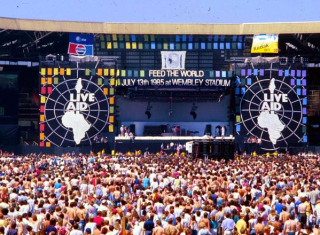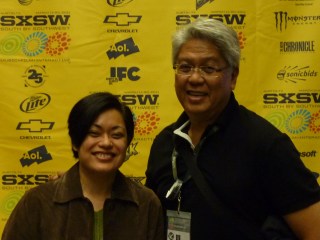Why do songwriters write? Why are songwriters so important? I remember having a talk about this with an old friend, Kjwan‘s Marc Abaya. We were standing on a balcony in Malaysia in 2007 on the eve of what I still think was their greatest show and these were questions he wanted me to answer. In truth, I didn’t have a clue because I don’t feel the same way artists do.
I can’t write a song. I can’t draw or paint. I can’t play an instrument. But something in me understands it when music touches me. There is a scientific explanation for it, I am sure, as to what connects music with emotions but I have no idea what IT is.
I cannot imagine my life without music whether it be the inspiring songs of Gary Valenciano, the anthems of U2, the diversity of The Beatles, the musicality of Led Zeppelin, the depth, breadth, and beauty of Classical music, or the sweeping and tragic melodies of Opera. I love it all.
Music is a soundtrack to so many things. Can you imagine a movie without the music that sets a mood? What would “Gladiator” be like without the moving theme of Hans Zimmer and the haunting humming of Lisa Gerrard? Would “Raiders of the Lost Ark” be as exciting without that John Williams’ score that heralded our hero, Indiana Jones, coming to the rescue? Would every onscreen kiss be as romantic without the dramatic music in the background? Probably not.
As a person who works in music and lives for it, I am constantly motivated to learn more about how these little notes, these 8 octaves, these hundreds of instruments, these countless voices can all be combined and compressed in endless ways into an average of five minutes and through it all have an impact that lasts a lifetime.
So, when through 7101 Music Nation, we convened the 1st Elements National Songwriting Camp in Dumaguete, Negros Oriental in November of 2010, I saw it as an opportunity to experience and explore up close music in the making. With mentors like Ryan Cayabyab, Louie Ocampo, Jay Durias, Top Suzara, Jim Paredes, Noel Cabangon, Joey Ayala, Rico Blanco, Gabby Alipe (Urbandub), Gary Granada, Gary Valenciano, Chito Miranda (Parokya ni Edgar), Ebe Dancel, Yael Yuzon (Sponge Cola), Jungee Marcelo, and Trina Belamide, it was impossible not to learn something. More than the actual crafting of a song, it was the motivation behind it that I was keen to find out.
Did it really matter that the styles of music and genres they represented were as different and diverse as the elements of nature that surrounded us during those five days by the sea and in the mountains?
Talks focused on the creative process, the history of OPM, the writing of lyrics, the business of music, and the role of technology and film. But it all ended with the responsibility and role of a songwriter.
In his closing talk, Gary Valenciano gave his insight into that. Here is an excerpt of that:
Director Quark Henares must have mulled over the same question as Marc did for the documentary he came up with also dealt with the same topic.
So many statements can be made through songs whether they be to reflect a individual’s state of mind or heart, a group’s set of beliefs, or at certain times, even a nation’s sentiment. Songs can entertain or enlighten, inspire or challenge, affirm and confirm, or simply, state a fact. That songs are able to capture moments in time is a gift to all who hear it.
Maybe I will never understand why songwriters’ minds and hearts think and feel the way they do. Maybe I will never understand why they get ME even though we may be centuries and worlds apart. For time and location have no bearing when the music at hand touches one’s soul.
Maybe their gift is that they are able to see and peel off the cumbersome layers of life and see or feel more of our humanity. Maybe they are simply more attuned. Their ability to create something that connects us all (for we all do not know each other) in a styling of sounds and even without words that we are all able to understand – THIS is what I think makes them so special.
So why do songwriters write songs? Why are they important? Maybe it’s because they simply are our voice in a language that others more than ourselves can understand. And maybe our role is to be their ears so that we can understand ourselves and each other better.
So to answer my friend Marc, I do not really know. But let’s just sit back and listen.
























